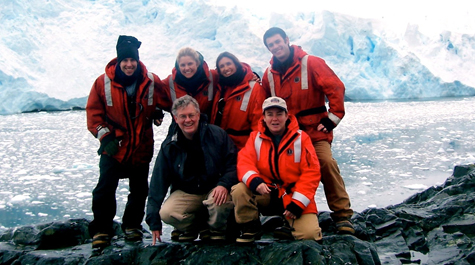Alumna puts conservation into practice
The web of life is remarkably resilient to natural and human impacts—from hurricanes to habitat fragmentation and climate change. But sometimes those forces threaten or overwhelm even the hardiest ecosystems. That’s when Kristin France enters the picture.
A 2007 alumna of the Ph.D. program at William & Mary's Virginia Institute of Marine Science, France is now the senior conservation scientist for The Nature Conservancy (TNC) in New York, where she helps to identify imperiled ecosystems and to develop effective conservation strategies for those areas. Her home base is TNC’s Central & Western New York chapter, which includes the Finger Lakes as well as areas along lakes Ontario and Erie.

VIMS Professor Emmett Duffy, France’s former advisor, says the position is a perfect fit.
“Before she ever came to VIMS, Kristin emphasized how passionate she was about putting science to work in conservation via a non-governmental organization, and I say more power to her,” says Duffy. “I think TNC is the perfect place for her at this point in her career.”
Duffy—recipient of the 2013 Outstanding Faculty Award from the State Council of Higher Education for Virginia—has been at VIMS for more than 15 years. He says France is one of the best students he has ever mentored. “She was goal-oriented and a major intellectual force in my lab,” says Duffy. “We worked together as colleagues in hashing out new ideas, developing proposals, and building collaborations.”
In 2006, France and Duffy co-wrote a research paper that appeared in the prestigious journal Nature. Their study looked at how biodiversity within seagrass communities aids in ecosystem stability and revealed an important spatial component to biodiversity and its effects on ecosystem processes.
At TNC, France co-chairs a statewide climate-change team, helping to coordinate all of the climate change-related work in New York State. France says she and her co-chair, who brings a policy background, “help set the team’s strategic direction, keep the pieces moving together and the channels of communication between different projects open and flowing, and help acquire funding for the work while connecting our work in New York to the efforts of larger organizations of TNC.”
France says VIMS helped her acquire a skill set to be able to “answer questions about what we need to know, rather than what it would be neat to know.”
“VIMS’ inclusion of applied science and its focus on figuring out how to help answer practical questions was really helpful,” says France. “A lot of training in academia is motivated by what we don’t know and to find interesting questions to answer, but in conservation work we try to figure out what we know enough about to act on.”
France earned her undergraduate degree in biology with a concentration in environmental ecology from Williamstown College in Massachusetts. She then moved to Seattle where she worked as a habitat-restoration technician—a position that sparked her interest in furthering her education. “I knew I wanted to have the experience that an advanced degree would confer, and be in a position to help make decisions about conservation or natural resources management.”
While working in Seattle, France began to sift through the literature and to visit the webpages of people studying ecosystem function and diversity. When she came across Duffy, and William & Mary’s School of Marine Science, she knew VIMS was the place for her. She made the move to Virginia in 2001, and ended up bypassing her Master’s degree to go straight for her Ph.D.
The daughter of an environmental engineer, France developed a love for science and an interest in working outdoors at an early age. As a scientist, her research has taken her everywhere from Antarctica to Lake Tanganyika and Tanzania in Africa.
France says her research cruise to Antarctica is her fondest memory of being a student at VIMS. “It was an other-worldly experience,” she says. “Because so many people are lucky enough to go to Antarctica during their tenure at VIMS, sometimes I can forget how unique an experience that is. It was a real privilege.”
After traveling to Massachusetts for college, Seattle for work, and Virginia for graduate school, France says she is happy to be settled back in her native New York, where she and her husband recently moved to a home in the foothills of the Catskills. They are now eagerly awaiting the arrival of their first child.
 When she isn’t working at TNC or busy preparing for motherhood, France enjoys getting outside and hiking, biking, or kayaking and says she loves living near the mountains. Dance classes are also one of her favorite pastimes.
When she isn’t working at TNC or busy preparing for motherhood, France enjoys getting outside and hiking, biking, or kayaking and says she loves living near the mountains. Dance classes are also one of her favorite pastimes.
France says her favorite part about being a student at VIMS was the community the school had to offer. “The support staff are fabulous,” she says. “I feel like VIMS has such a supportive and collaborative community.”
France has found a similar environment at TNC, saying one of the most rewarding parts of her job is working with her colleagues. “I feel priviledged to work with so many great coworkers who are committed, innovative thinkers, and good problem solvers,” she says. “As a part of a large non-profit I get to work with a wide range of people and collaborate with people from all over the U.S. and sometimes internationally, which I really enjoy.”


















